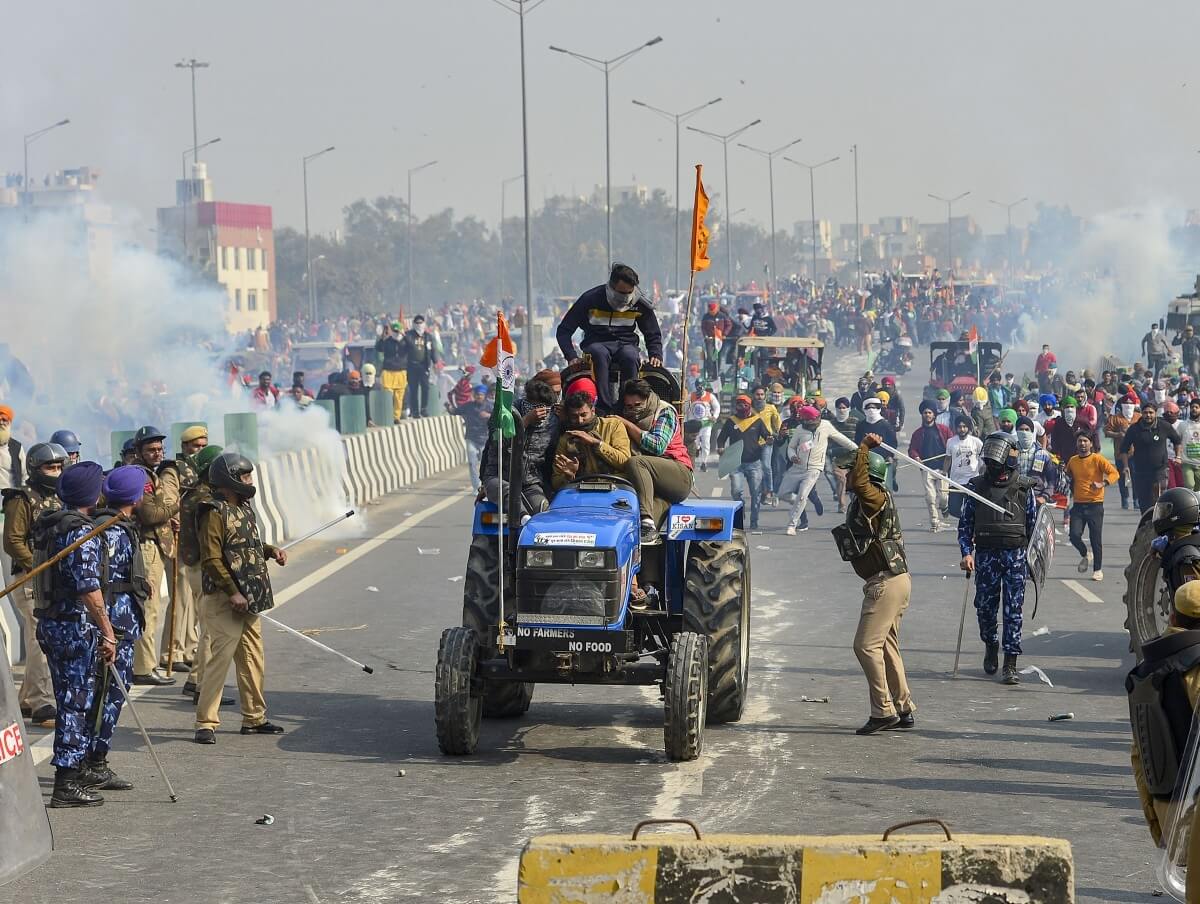As India celebrated its 72nd Republic Day, the farmers protest in New Delhi took a violent turn. At least one protestor is reported to have died in the clash, with around 80 police officers injured. Citing security reasons, the central government imposed an internet shutdown and suspended the metro services in some areas in the capital city. Moreover, to contain the violence, the government also brought in 15 companies of paramilitary forces to disperse the protests.
The protestors had previously requested permission for a “tractor” rally for Republic Day and had consequently assembled in large crowds in the capital city. However, despite opposition from the government, the permission was granted to the protestors by the police on the condition that the rallies be taken out after the completion of the Republic Day parade. Further, they were allowed to conduct the protests on specific routes which were largely restricted to the city’s outskirts. However, as the demonstrators pushed down barricades to enter the central regions of the capital city, the Delhi police retaliated with tear gas and lathi-charge, attempting to disperse the protestors. The protesting farmers stormed the Red Fort and hoisted a “farmers” flag beside the national flag. According to a statement by the New Delhi police, “The farmers began tractor rally before the scheduled time, they also resorted to violence and vandalism.”
Tuesday’s incident instigated several political leaders, who had offered their support to the farmers’ cause previously, to speak out against the incident. For instance, Amarinder Singh, Punjab’s Chief Minister, said, “The violence by some elements in unacceptable. It will negate the goodwill generated by peacefully protesting farmers.” He further urged all “genuine farmers to vacate Delhi and return to borders.”
Shashi Tharoor, a leader of the opposition party, the Indian National Congress, also spoke out against the incident, saying that he could not “condone lawlessness.” He also urged the protestors to “resolve this crisis through democratic means, not force.” However, he also expressed his regret about the protestor’s death and called upon the authorities to “observe restraint.”
Further, Yogendra Yadav, the President of Swaraj India and a prominent leader of the protest, said, “Being a part of the protest … I feel ashamed of the way things proceeded and I take responsibility of it.” He added, “Violence impacts any kind of protest in a wrong way. I cannot say at the moment who did it and who did not, but prima facie it looks like it has been done by the people that we kept out of the farmers’ protest.” He also said that he had repeatedly urged the protestors to abide by the conditions set by the police and “not deviate.”
The violence was also condemned by Samyukta Kisan Morcha, an organisation that represents 40 farmers’ unions, who said that “anti-social elements had infiltrated the otherwise peaceful movement.” Their statement declared, “We condemn and regret the undesirable and unacceptable events that have taken place today and dissociate ourselves from those indulging in such acts.” However, they said that, while the violence was not supported by the unions, the protests would not end and they would continue to pressurise the government to revoke the controversial laws. Further, Rakesh Tikait, the Bharatiya Kisan Union (BKU)’s leaders, distanced himself from the violence saying, “We know the people who are trying to create disturbance, they are identified. There are people from political parties who are trying to malign the agitation.”
For months now, thousands of protesting farmers have assembled near New Delhi to protest against the newly introduced laws that the farmers believe to be detrimental to their interests. The agricultural reform bills that have led to this nationwide agitation—The Farmers’ Produce Trade And Commerce (Promotion And Facilitation) Bill, The Farmers (Empowerment and Protection) Agreement on Price Assurance and Farm Services Bill, and The Essential Commodities (Amendment) Bill—have been criticised for being too liberalised and for assuming that the current structure is devoid of private entities. Farmers fear that changes to the crucial minimum support price clause, doubled with the ease of business for corporate entities, will further complicate their lives, as they already struggle to sell goods. Further, the laws have been slammed for being opaque and providing no redressal mechanisms or sureties to farmers, with the government essentially stepping back from its role as a guarantor in a free market system.
The farmers and the government have also entered into nine rounds of negotiations, all of which have been unsuccessful. The Supreme Court of India has further set up a committee to assess the demands of the farmers and reach a solution. While the government has offered to suspend the laws for one and a half years, until the negotiations are concluded, yesterday’s violence will act as a major obstacle in the farmers’ cause. A government official, speaking to the Indian Express, said, “Our strategy going forward will definitely change … You cannot enter Red Fort by force, plant a flag there and then say let's talk about the laws.” He also said that Tuesday’s violence raises questions on the ability of the leaders to negotiate on behalf of the protestors. He said, “If the farmers’ leaders arrive at an agreement with us and these people do not accept that, what will these leaders do? Today’s incidents show their writ may not even run.”
Farmers’ Protests: What Happened Yesterday?
As India celebrated its 72nd Republic Day, the farmers’ protests in New Delhi took a violent turn.
January 27, 2021

SOURCE: AFP
